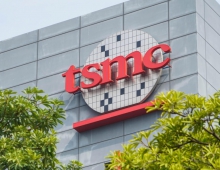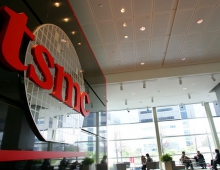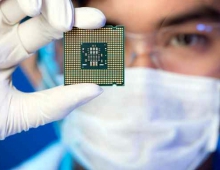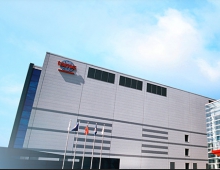
TSMC Enjoys Q4 Profit, Getting Ready For More Efficient Chips
Taiwan Semiconductor Manufacturing Company (TSMC), the world's biggest contract chipmaker, has reported record consolidated revenues and profits for 2013 and is aims to "outcompete" Intel and Samsung in chips made with its upcoming 16nm manufacturing process.
Consolidated revenues at TSMC came to NT$597.02 billion (US$19.8 billion) in 2013, rising 17.8% on year, while net profits soared 13.1% to NT$188.15 billion. Net EPS for the year arrived at NT$7.26.
TSMC's revenue has been growing as a result of surging sales of smartphone and tablets. The company manufactures 28nm chips for companies like Qualcomm and Nvidia, with Apple also rumored to be one of its clients. The 28nm manufacturing process accounted for 34 percent of TSMC's chip making revenue in the fourth quarter.
TSMC will see its 2014 sales register another double-digit increase, outperforming the worldwide foundry sector, according to company chairman Morris Chang.
TSMC has guided consolidated revenues for the first quarter of 2014 will drop about 6% sequentially. However, sales will rebound significantly in the second quarter of 2014, Chang suggested. Demand for mobile devices and growth in shipments of 28nm and 20nm SoC chips will have an effect on the company's revenues in the quarter, Chang noted.
Revenues generated from the mobile device sector will drive TSMC's sales growth in all of 2014, Chang said.
During Thursday's earnings call, company executives said TSMC's 16nm manufacturing process, slated to go into production later this year, will help it make chips that rival technology from Intel and Samsung.
"Recently Intel published some data that our 16 FinFET project has been behind and we think that the data is highly misleading," Chang said. He later added, "Our grand alliance will outcompete Intel and Samsung," referring to TSMC's partnership for 16nm manufacturing technology with its customers.
Intel is preparing a 14nm process, and using it to build its new Broadwell processor. The company, however, said in October that production of its Broadwell chips will be pushed back until the first quarter of this year due to a manufacturing defect in the technology.
Samsung is also working on 14nm chip making technology.
TSMC also disclosed that shipments of 28nm process technology reached 34% of its total wafer revenues in the fourth quarter of 2013, compared to 22% a year ago. In addition, the foundry's 20nm SoC process is ready for volume production in the first quarter of 2014.
In addition, Chang predicted the worldwide IC industry will grow 5% in 2014, while the fabless and foundry sectors will increase 8% and 10%, respectively.
TSMC's revenue has been growing as a result of surging sales of smartphone and tablets. The company manufactures 28nm chips for companies like Qualcomm and Nvidia, with Apple also rumored to be one of its clients. The 28nm manufacturing process accounted for 34 percent of TSMC's chip making revenue in the fourth quarter.
TSMC will see its 2014 sales register another double-digit increase, outperforming the worldwide foundry sector, according to company chairman Morris Chang.
TSMC has guided consolidated revenues for the first quarter of 2014 will drop about 6% sequentially. However, sales will rebound significantly in the second quarter of 2014, Chang suggested. Demand for mobile devices and growth in shipments of 28nm and 20nm SoC chips will have an effect on the company's revenues in the quarter, Chang noted.
Revenues generated from the mobile device sector will drive TSMC's sales growth in all of 2014, Chang said.
During Thursday's earnings call, company executives said TSMC's 16nm manufacturing process, slated to go into production later this year, will help it make chips that rival technology from Intel and Samsung.
"Recently Intel published some data that our 16 FinFET project has been behind and we think that the data is highly misleading," Chang said. He later added, "Our grand alliance will outcompete Intel and Samsung," referring to TSMC's partnership for 16nm manufacturing technology with its customers.
Intel is preparing a 14nm process, and using it to build its new Broadwell processor. The company, however, said in October that production of its Broadwell chips will be pushed back until the first quarter of this year due to a manufacturing defect in the technology.
Samsung is also working on 14nm chip making technology.
TSMC also disclosed that shipments of 28nm process technology reached 34% of its total wafer revenues in the fourth quarter of 2013, compared to 22% a year ago. In addition, the foundry's 20nm SoC process is ready for volume production in the first quarter of 2014.
In addition, Chang predicted the worldwide IC industry will grow 5% in 2014, while the fabless and foundry sectors will increase 8% and 10%, respectively.





















